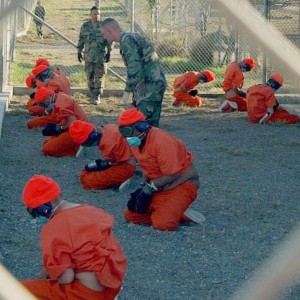Though many of today’s domestic and international crises date back to George W. Bush’s presidency, Republicans see a political edge in frustrating President Obama’s efforts to solve them, reveling in a new narrative about Obama’s “weakness.” The Guantanamo mess is a case in point, says ex-CIA analyst Paul R. Pillar.
By Paul R. Pillar
The national disgrace that is the detention facility at Guantanamo Bay is still in operation largely because of another familiar national disgrace, which is partisan gamesmanship.
At his press conference this past week President Barack Obama stated accurately the multiple reasons, which include significant political damage to U.S. interests overseas, the facility needs to be closed. Those reasons are even more compelling today, amid force-feeding of hunger-striking prisoners, than they were when the then newly inaugurated Mr. Obama first committed to closing the place.

Early detainees at the Guantanamo Bay prison, dressed in orange jumpsuits with goggles covering their eyes, photographed on Jan. 11, 2002. (Defense Department photo by Petty Officer 1st class Shane T. McCoy, U.S. Navy)
A prevalent theme in current commentary is that a fluent but timid president is not getting anything done about Guantanamo because he is displaying the kind of weakness that is also preventing him from getting things done on gun control and other issues.
Civil libertarians and others who might usually be sympathetic to Mr. Obama charge that he has been an insufficiently tough leader in dealing with a recalcitrant Congress that has placed multiple roadblocks in the way of closing Guantanamo, including a ban on movement of any of the detainees to federal prisons or any other facilities in the United States.
One is entitled to ask in such situations whether the responsibility lies with someone who cannot overcome recalcitrance or with those who are being recalcitrant. But let us instead just review the bidding on how Guantanamo got to be what it is now.
One can identify three motives, all of them misguided at best and reprehensible at worst, that have been involved. They partly correspond to different phases in the detention facility’s history.
The original decision by the Bush administration to construct a jail in such an odd place was intended to keep it, and the prisoners in it, outside the reach of any laws. Subsequent decisions by the Supreme Court kept that objective from being fully realized. In any event, the objective was unworthy, given that the United States is a country of laws and not of arbitrary actions by whoever happens to have power at the moment.
A second motive, which still underlies some of the congressional recalcitrance, is to make an ideological statement that terrorism is “war” rather than “crime” and therefore anyone suspected of involvement in terrorism should be treated differently from anyone else suspected of a crime.
Making ideological statements at the expense of real damage to U.S. interests and to American principles (and doing so while disregarding the record of what has or has not worked, including the successful record of convicting terrorists in federal criminal courts) is an inexcusable way to make policy.
A third motive, which is behind much of what we see playing out about Guantanamo today, is to retain the opportunity, with future elections in mind, to inflict costs and embarrassment on one’s domestic political opponents. Congressional opponents of President Obama are quick to point out that legislation that has constituted much of the roadblock to closing Guantanamo gives the administration the ability to use waivers to release individual detainees to the custody of foreign countries.
Such opponents are not quick to address, of course, why such hurdles and special waiver requirements should have been thrown up in the first place. But in the meantime, it enables the opponents to say the President has not used administrative powers he already has to reduce Guantanamo’s prisoner population.
The biggest hoped-for partisan political payoff would come if the waiver authority were actually used. That authority is a dare to the administration to make a mistake.
To release a prisoner to foreign custody the Secretary of Defense has to make certifications about how the receiving country will take steps that ensure the individual will not engage in terrorist activity in the future, or about “alternative actions” that will “substantially mitigate” such a possibility. All of this gets into realms in which it is impossible for any secretary of defense or president to make guarantees.
Recidivism happens. With the anger and resentment building up among the men who are getting tubes shoved up their noses twice a day, there is a significant chance it will happen even with someone who was not really a threat when he was first brought to Guantanamo. Not even the most careful screening and review process is foolproof.
And so the first time any alumnus of Guantanamo gets involved in what can be described as a terrorist incident, there is a ready-made issue to introduce in the next election campaign back in the United States. The administration endangered the American public, will be the charge from some members of Congress, who will disavow any responsibility themselves.
Count Guantanamo among the many issues of public policy on which the national interest has suffered at the hands of politicians who place that interest behind considerations of partisan advantage. Count it also among the issues on which the American public’s unrealistic zero-tolerance attitude toward terrorism facilitates such political shenanigans.
Paul R. Pillar, in his 28 years at the Central Intelligence Agency, rose to be one of the agency’s top analysts. He is now a visiting professor at Georgetown University for security studies. (This article first appeared as a blog post at The National Interest’s Web site. Reprinted with author’s permission.)

…and don’t forget fbi/cia murderous operation globally:
Recent Events showing fbi counterintelligence operations against me:
http://la.indymedia.org/news/2013/05/259678.php
http://www.sosbeevfbi.com/part19c-updatefo.html
http://la.indymedia.org/news/2013/04/259589.php
http://www.sosbeevfbi.com/part19c-updatefo.html
http://portland.indymedia.org/en/2013/04/422833.shtml
fearful trembling
http://barcelona.indymedia.org/newswire/display/460988/index.php
World In A Box:
http://www.sosbeevfbi.com/part4-worldinabo.html
Living Dead:
http://barbarahartwellvscia.blogspot.com/2011/10/living-dead-frightful-lot.html